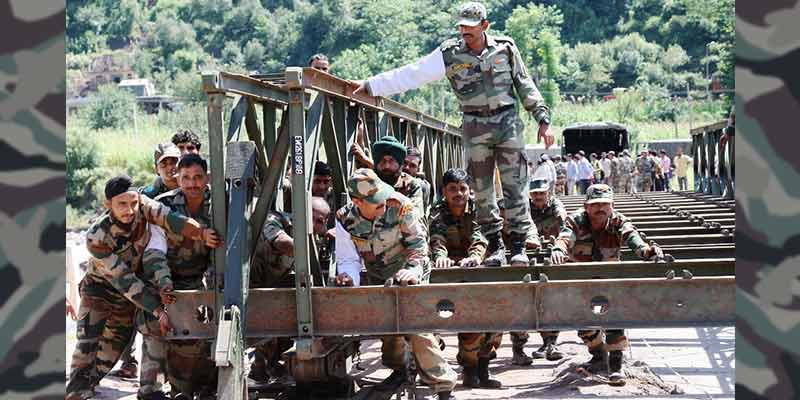- India
- Oct 09
Explainer / Operation Sadbhavana
The army has undertaken a large number of military civic action programmes sponsored and funded by the Union government aimed at winning the hearts and minds of the people in the areas affected by terrorism and insurgency in Jammu & Kashmir and northeastern states under Operation Sadbhavana.
The focus of Operation Sadbhavana in these regions has been towards development of core social indices of quality education, women’s empowerment, community and infrastructural development, health and veterinary care, development of Gujjar / Bakarwals and nation-building.
Operation Sadbhavana is not only a tactical or strategic manoeuvre of the army but also a resolve by the men in uniform to come closer to the populace and develop a bond of mutual faith and trust which a soldier enjoys across the county.
Background
Operation Sadbhavana (goodwill) is an unique humane initiative undertaken by Indian Army to address the aspirations of people affected by the scourge of terrorism. It was launched in 1998 with a budget of Rs 4 crore.
Its aim was supplementing efforts of the state administration in restoring public services, rebuilding infrastructure and creating a conducive environment for development.
The focus is to improve the overall core social indices of education, women and youth empowerment and health care with simultaneous thrust on capacity building through implementation of community / infrastructure development projects.
Education
Ever since the inception of Operation Sadbhavana, the Indian Army has established 46 Army Goodwill Schools and rendered assistance to approximately 1,900 state government-run schools by carrying out renovation, modifications, infrastructure augmentation and provisioning of equipment.
Approximately 14,000 students are currently enrolled and close to 1 lakh children have obtained primary / higher secondary level quality education.
With an aim to provide equal opportunities to children from marginalised section of society and those affected by terror attacks, the army has been sponsoring the cost of their education.
Approximately 840 students are receiving scholarships for studies in schools. The army has assisted nearly 565 students to obtain admission in various institutions outside the state.
J&K has a unique mix of population which also comprises Gujjars / Bakarwals (nomadic tribes) in sizeable numbers. These nomadic groups migrate every year within the state in the summer to upper reaches and to lower foothills in winters. While doing so they traverse all three distinct regions of the state. In order to ensure that their children get quality basic and middle school education, the army is running special ‘Shepherds Schools’, a unique initiative at various areas that are frequented by the nomadic groups.
The Super 30 programme in J&K was launched in 2014. It is based on the model of Super 30 in Bihar that has attained global recognition. The Kashmir Super 30 is being run in partnership with the Centre for Social Responsibility and Leadership.
Infrastructure development
Extensive damage to the state infrastructure was inflicted by terror attacks in the early 1990s. The fear of terror inhibited government agencies to function freely and restore damaged infrastructure or undertake new projects, thereby, leaving a gaping void in the state’s infrastructure.
The army stepped in to bridge the void by providing assistance and undertaking a number of small / large infrastructure projects and ameliorate conditions of the local population.
Augmenting of water supply schemes, provision of road / track connectivity, construction of small bridges and electrification projects are undertaken to improve quality of life.
Model villages
The army has supported model villages where schools, computer training centres, a basic medical facilities and a gymnasium are all contained in one complex in the vicinity of a few villages. Sagra model village and Chandigam model village are examples.
Health and sanitation
To cater for the medical needs of the people living in remote and inaccessible areas, a number of medical aid / health centres have been set up. These centres have been providing essential medical aid to locals and are equipped with modern equipment.
Villagers are regularly being educated on family planning, child care, basic hygiene, sanitation and precautions against local ailments at these centres.
Mobile medical teams have been regularly dispensing medical care and medicines at the doorstep of needy population through the medium of health camps.
Women and youth empowerment
Special emphasis is being laid to empower women by organising skill development training like operating of computers, knitting, tailoring, candle making, bag making, carpets / basket weaving, horticulture and fashion designing at various vocational training centres.
Regular interactions with bank and government officials are being organised to initiate them into banking and financial management.
Besides women, unemployed youth are being provided with opportunities for becoming self-employed. Numerous Youth Guidance Employment Nodes have been established across the state to create awareness about job opportunities, competitive exams and eligibility criteria for seeking employment in government / civil sector. Competent trainers and counsellors train the youth and assist them to develop skills for seeking jobs and availing employment opportunities on their own merit.
National integration tours
National integration tours (educational and motivational initiatives) are being organised with an aim to integrate students and opinion makers from all regions of the state with the national mainstream as also to provide them with an opportunity to experience the rich cultural diversity and varied traditions of other parts of the country.
These tours enable the participants to experience development and growth in other regions and act as catalysts for channelling their energies to achieve higher goals in life.
On an average, 70-100 such tours comprising 25-30 participants are being sent each year to various cities in the country.
Sports
To boost and revive sports activities on requests by the state government, seven stadiums have been constructed in Bandipur, Ganderbal, Kulgam, Budgam and Shopian. These stadiums have a seating capacity for 5,000-7,000 people and facilities for conducting sports tournaments. To identify and nurture talent, a number of activities and tournaments such Jammu Premier League and Kashmir Premier League have been organised.

